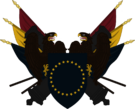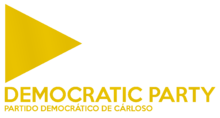List of political parties in Carloso
 |
|---|
| This article is part of a series on the politics and government of the Federal Republic of Carloso |
Related topics
|
There are numerous political parties in Carloso. Historically, the political scene in Carloso was dominated by three main parties; the Conservative Party, Democratic Party and Socialist Republicans. However, as a result of the Corrective Revolution in 2010, the establishment parties have been significantly weakened and the nationalist Conservative-offshoot National Salvation has been the dominant party since the 2011 general election.
Political parties with representation in the National Assembly
| Party | Ideology | Position | Founded | Leader | National Assembly | Musgorocian affiliation | |
|---|---|---|---|---|---|---|---|
| National Salvation | Republicanism National conservatism Right-wing populism Anti-communism |
Right-wing | 2010 | Cárlos Tobón | 507 / 859
|
None | |
| Conservative Party | Liberal conservativism Christian democracy Economic liberalism |
Centre-right | 1893 | Ferdinand Casares | 183 / 859
|
People's Movement | |
| Democratic Party | Liberalism Social liberalism Progressivism Anti-clericalism Economic liberalism |
Centre | 1868 | Eric O'Neill | 68 / 859
|
Liberal Alliance | |
| Socialist Republicans | Social democracy Democratic socialism Progressivism Feminism |
Centre-left | 1901 | Maria Chambers | 30 / 859
|
United for Change | |
| Synarchist Union | Ultranationalism Neo-fascism Synarchism |
Far-right | 1975 | Damián Torrero | 24 / 859
|
Pan-Musgorocian Congress | |
| Communist Party | Marxism-Leninism Anti-capitalism |
Far-left | 1929 | Thomas Bates | 18 / 859
|
Alliance of Workers | |
National Salvation
National Salvation (Carlosian: Sélvasion Násional) is a right-wing, conservative, nationalist political party in Carloso. It was formed in 2010 by former members of the Conservative Party in the aftermath of the Blue Revolution, mainly in reaction to plans to hold a referendum on the legalisation of abortion and various other social reforms instigated by the Conservative–Democratic coalition government at the time. After the collapse of Conservative support in the general election, National Salvation picked up a huge chunk of the voter base and secured a near-majority in the National Assembly, securing a confidence and supply deal with a group of rural independents to form a government in 2011. In 2015 it secured an outright parliamentary majority. At present, it is the largest party in the country in terms of both membership and voter share.
Political commentators hostile to the positions of the party have labeled it as being far-right and extremist. The ideology of National Salvation can be broadly described as national conservative. It opposes abortion, the normalisation of homosexual relationships, divorce, social liberalism and moral relativism in general. It also opposes secularism and favours integralism. It is an anti-communist party and advocates subsidiarity, reindustrialisation and distributism on a Christian democratic platform. It supports and has implemented the death penalty for particularly grievous crimes, including murder, rape, abortion, and distribution of drugs. On foreign policy, it wishes to continue Carloso's membership of SACTO and deepening economic ties with allied countries. National Salvation opposes multilateralism and globalism. Its main voter base is middle and working-class Carlosians, with strong support from both Catholics and Presbyterians.
National Salvation has 507 National Assemblymen and 3,253 seats in provincial assemblies.
Conservative Party
The Conservative Party (Spanish: Partido Conservador) is a centre-right political party in Carloso. It is the second oldest party in the country, formed in 1893. It dominated Carlosian politics for most of the 20th century and the early years of the 21st, with only brief interruptions by the Democratic Party during the 1960s and from 2001 to 2006. Initially considered a staunchly nationalist, conservative and anti-communist party for much of its existence, it began to soften its stances beginning in the 1990s with the downfall of the communist regimes in Musogorica, embracing neoliberal economics. The Blue Revolution in 2010 resulted in the near-total collapse of the Conservative Party's support, producing its worst-ever election result. Most of the grassroots, financial backers and the national conservative faction of the party defected to the new National Salvation, a splinter group led by former Minister for Finance Cárlos Tobón and businessman Estebán Santander. The party has struggled to recover since then.
The Conservative Party has 183 National Assemblymen.
Democratic Party
The Democratic Party (Spanish: Partido Democrático) is a centrist, liberal political party in Carloso. It is the oldest party in Carloso, having been founded in the 1868. Historically, the Democratic Party has been a secondary force in Carlosian politics, with the Conservative Party consistently outperforming it and denominating government. Carloso has had Democratic heads of government from 1881 to 1901, 1931 to 1941, 1961 to 1966 and 2001 to 1996. Following the Blue Revolution, support for the Democratic Party was significantly reduced. After the resignation of Michael Gallagher as leader, the party has been beset with factionalism.
The Democratic Party has 68 National Assemblymen.
Socialist Republicans
The Socialist Republicans (Spanish: Republicanos Socialistas) is a left-wing, socialist political party in Carloso. It was founded in 1901, growing out of the trade union movement. Historically its voter base was working-class Carlosians, though nowadays it finds more support amongst people in affluent urban areas. The Socialist Republicans have been part of three coalition governments alongside the Democratic Party, from 1936 to 1941, 1961 to 1966 and from 2001 to 2006.
The Socialist Republicans currently have 30 National Assemblymen and their present leader is Maria Chambers.
Synarchist Union
The Synarchist Union (Spanish: Unión Sinarquista) is a far-right neo-fascist, synarchist party. It advocates for the political and culutural integration of Musgorocia.
The Synarchist Union has 24 National Assemblymen and 219 seats in provincial assemblies.
Communist Party
The Communist Party (Spanish: Partido Comunista) is a far-left, communist party. It was formed in 1929 out of the remnants of the original Red Vanguard organisation, which was banned after the failure of its uprising against the Carlosian government in 1919.
The Communist Party has 18 National Assemblymen.
Comparison of political positions of major political parties
| Party | Support right to abortion? | Support end to capital punishment? | Support legalisation of cannabis? | Support same-sex marraige? | Support current limits on immigration? | Support membership of SACTO? | Believe climate change is a national emergency? |
|---|---|---|---|---|---|---|---|
| National Salvation | No | No | No | No | Yes | Yes | No |
| Conservative Party | No | Yes | No | Yes | No | No | Yes |
| Democratic Party | Yes | Yes | Yes | Yes | No | No | Yes |
| Socialist Republicans | Yes | Yes | Yes | Yes | No | No | Yes |
| Synarchist Union | No | No | No | No | Yes | No | No |
| Communist Party | Yes | No | No | No | Yes | No | No |
Political parties with representation at the provincial level
| Party | Ideology | Position | Founded | Leader | Provincial Assemblies | Musgorocian affiliation | |
|---|---|---|---|---|---|---|---|
| Green Alternative | Green politics Eco-socialism Anti-capitalism |
Left-wing | 1986 | Benjamín Lacasa | 81 / 7,246
|
Focus Green | |
| Interés Zamora | Zamoran nationalism National conservatism Right-wing populism Separatism |
Right-wing | 1994 | Xavier Tomas Santiago | 51 / 192 (Only runs in Zamora)
|
Regionalists for Justice | |
| Solidarity & Co-operation | Trotskyism Socialism Environmentalism Feminism Anti-capitalism |
Far-left | 2011 | Collective leadership | 3 / 7,246
|
Militant Tendency | |
Green Alternative
Interés Zamora
Political parties with no representation
| Party | Ideology | Position | Founded | Leader | Musgorocian affiliation | |
|---|---|---|---|---|---|---|
| Pragemos | Pragmatism Radical centrism Monarchism |
Centre | 2017 | Union for a Pragmatic Musgorocia | ||
| Traditional Right | Monarchism Social conservatism |
Right-wing | 2004 | None | ||
| Party for Men — It is our time! | Men's rights Nationalism |
Far-right | 2018 | None | ||
Other parties
Defunct parties
| Party | Ideology | Position | Founded | Dissolved | |
|---|---|---|---|---|---|
| National Party | Agrarianism Populism |
Centre-right | 1923 | 1977 | |
| Liberal Union | Economic liberalism Conservative liberalism |
Centre | 1961 | 1988 | |




